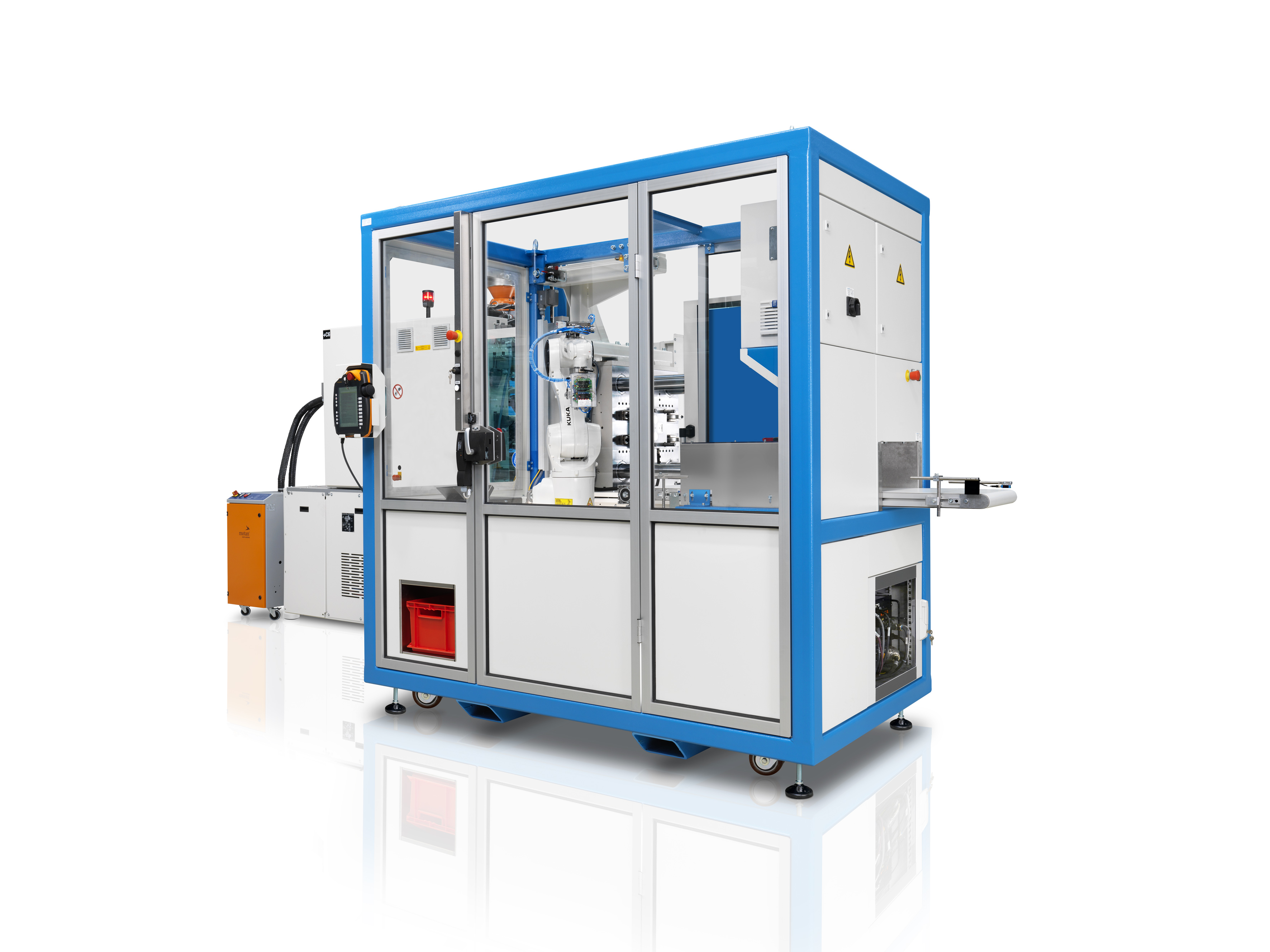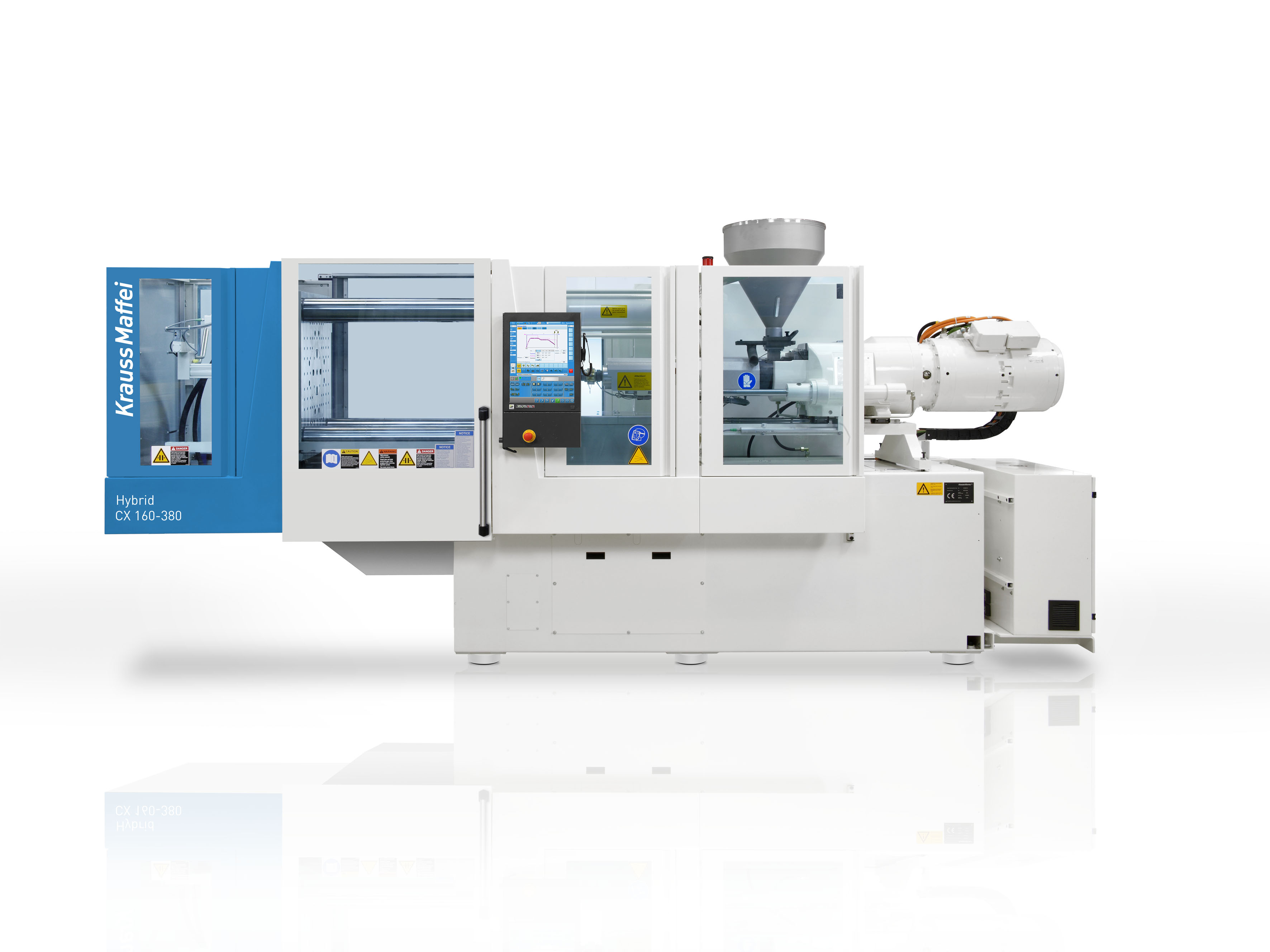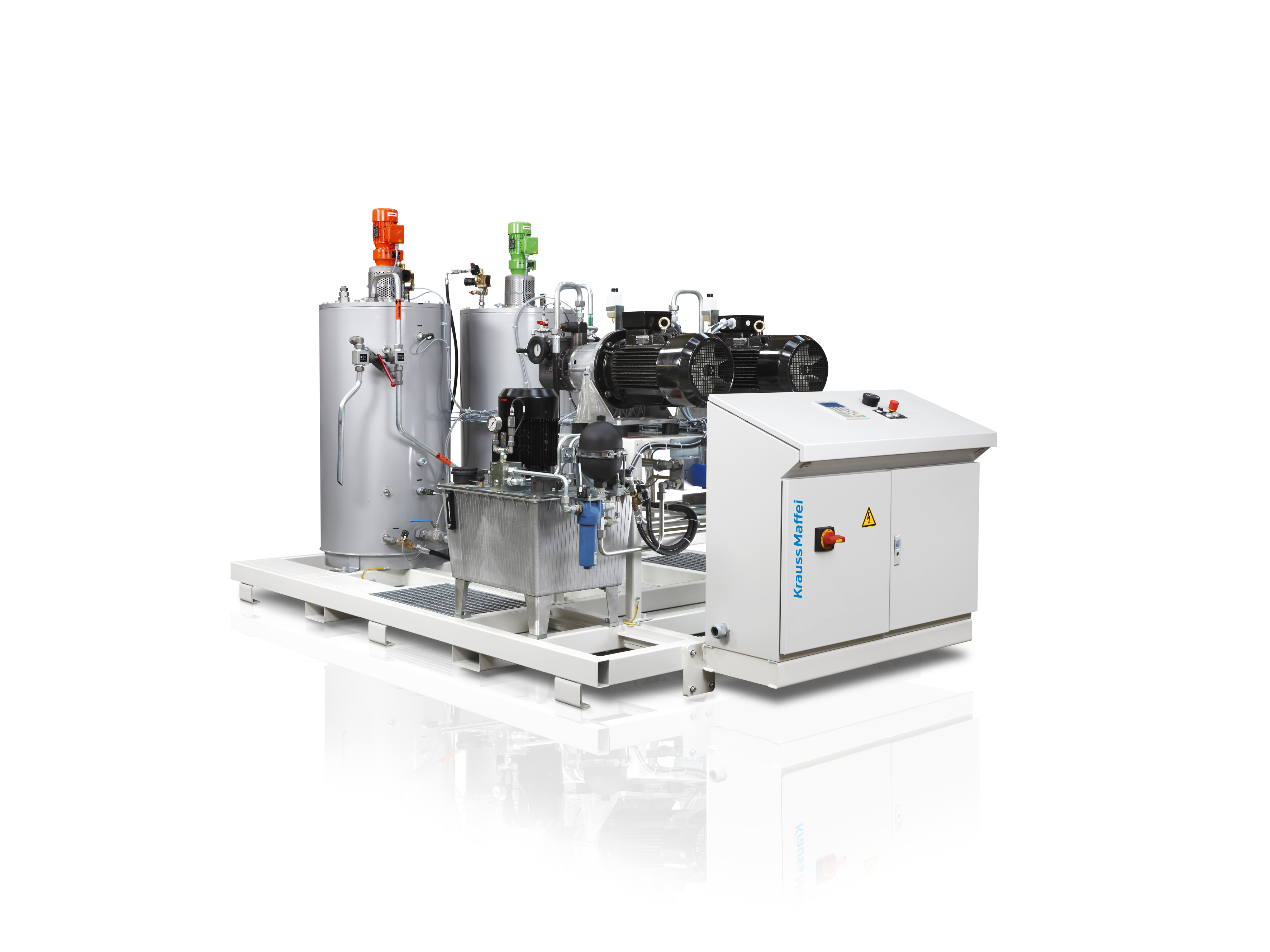|
– The entire portfolio of standard injection molding machines is represented, from all-electric and hydraulic all the way to hybrid
– Mobile robot cells prove their value in multi-component applications through their high flexibility during production
– New adaptive process control system (APC) provides more process reliability and enhances zero-defect performance
|
|
(Munich, August 7, 2014) At Fakuma 2014 (Hall A7, Booth 7303/7304), KraussMaffei is focusing on all-electric, hydraulic and hybrid injection molding solutions based on the standard machines of the AX and CX series. The production solutions demonstrate the high productivity and innovative detailed solutions with respect to energy efficiency, automation, space-saving design and zero-defect production. The trade show appearance of KraussMaffei Reaction Process Machinery is expanding to include the new, smallest size of the EcoStar 8/8 mixing and metering system.
|
|
All-electric AX machines with high energy efficiency All-electric AX series injection molding machines from KraussMaffei feature resource-efficient manufacturing with high repeatability. They earn a rating of Class 9+ on energy efficiency tests. “Compared to similar hydraulic injection molding machines, energy consumption is reduced by 50 percent or more,” explains Jochen Mitzler, Head of Strategic Product and Technology Management at KraussMaffei. At Fakuma, the smallest all-electric production cell, an AX 50-180, will demonstrate injection molding that is extremely precise and energy efficient by manufacturing a soap stick container made of polystyrene. The optimized 5-point toggle design, efficient servo motors and the easy action of its mechanical systems guarantee the optimum efficiency of the machine. A flow monitoring system integrated in the MC6 machine control system for the cooling/temperature control water makes a contribution towards zero-defect production and documents the process values of mold heat-balancing. The AX series therefore offers optimum prerequisites for efficient and precise manufacturing. It lets the processor produce flexibly, reliably and, above all, at low unit costs. An additional step in reducing unit costs is the use of CellForm technology, which reduces component weight through physical foaming and simultaneously increases dimensional stability. Interested visitors can visit the booth at GWK (Hall B1, Booth 1205), where they will be impressed by a KraussMaffei AX 130-750 CellForm with an integrated LRX 50 linear robot that produces foaming components with high-gloss surfaces. “This is made possible through the use of dynamic mold heat-balancing. A design suitable for use with MuCell provides up to 35 percent material savings,” says Mitzler. The AX machine exhibited at Fakuma is equipped with the new MuCell system. It is particularly easy to operate because all parameters are integrated into the MC6 control system and, thanks to a new dosing unit, it is very compact. CX 80 Hybrid reinforces functional integration
Functional integration is the buzzword for the Blue Competence campaign initiated by VDMA at Fakuma 2014, in which KraussMaffei is participating. At the KraussMaffei booth, a CX 80 Hybrid will demonstrate how strip conductors with press and hold functions can be integrated directly into a thermoplastic component. The IMKS procedure is used for the two-component part (integrated plastic-metal injection molding). The metal injection unit adapted for this purpose by the KraussMaffei mold partner Krallmann can be positioned particularly well in the large mold area of the CX machine. The smallest KraussMaffei linear robot, the LRX 50, removes components through lateral mounting and storing within the standard protective enclosure. “The standard protective enclosure of the machine serves as a robot safety fence, which saves approximately 100 percent of the installation area used for conventional automation,” says Mitzler. The basic principle of the CX Hybrid series is a combination of the advantages of the space-saving hydraulic clamping unit (twin-plate technology) with those of the electrically driven injection unit. This unit features high precision injection and is able to plasticize during the mold movement. The new BluePower drive, in combination with the hybrid injection unit, reduces energy consumption in spite of its high power density. More flexibility in production thanks to mobile automation cell At Fakuma, the new CX 160 Multinject will prove to be an impressive production cell, with compact dimensions, flexible operation and robot types that are ideally adapted to the machines. The standardized automation cell is docked on the operator rearside of the machine, particularly on multi-component machines with V units. The mobile robot cell provides high flexibility in production, and can move from one machine to the other and connect without significant effort. The core of the machine is a small robot from the Kuka-Agilus series, with a payload of 6 kg and a range of 900 mm. The main feature of this industrial robot is a high working speed and equally high precision. The integration of robot cells into the machine control system is a particularly appealing option. As with the fixed pendant installed on the machine, the injection molding machine can be operated via the handheld pendant of the robot control system. Conversely, the operator can control the automation cell via the MC6 control system of the machine. At Fakuma, a CXV 160 will produce multi-component parts from a hard polycarbonate and a soft plastic for the automotive industry. Adaptive process control system (APC) supports zero-defect production Even in high-precision injection molding machines, fluctuations occur during the manufacturing process. These fluctuations are triggered by a wide variety of external factors, such as batch variations. This can cause the process that was initially correctly configured to exceed the defined quality tolerances, which inevitably leads to the production of reject parts. Thanks to an innovative approach to the adaptive process control system (APC), KraussMaffei has now developed a machine function that will automatically respond to fluctuations as early as the injection process. “The fact that component quality in the APC is the definitive control variable is revolutionary. The APC function allows online intervention during any cycle for corrective purposes. This opens up previously unknown possibilities for injection molding,” says Dr. Reinhard Schiffers, Head of Machine Technology at KraussMaffei. The adaptive process control system automatically adjusts to the changeover point and the holding pressure profile in each cycle, which ensures that significantly fewer article fluctuations occur. This increases both function and component quality. Additional advantages: the process for dealing with interfering effects is becoming more effective. Fewer user interventions are necessary, and faster startup is possible. “Thanks to the adaptive process control system, zero-defect production is possible. Even difficult raw materials, such as mixtures or recycled material, enable consistent processing of high-quality components,” says Schiffers. The APC function, which will be presented live at Fakuma, will be included on all KraussMaffei machines: all-electric, hydraulic and hybrid. Smallest universal PU machine The focal point of reaction process machinery from KraussMaffei at Fakuma is the new smallest size of the EcoStar polyurethane mixing and metering machine. “The EcoStar 8/8 features a pump output of 8 l/min and is ideal for first applications, simple manufacturing concepts and small series with low output rates,” explains Steffen Bauer, Sales Manager for the German division. PU metering machines from the KraussMaffei EcoStar series stand out due to their high quality and low investment costs. The attractive price/performance ratio is based on consistent standardization and a reduced number of product variants. Furthermore, all the elements of the EcoStar series are engineered to very high standards to ensure a reliable and stable process and very high product quality. Just like all other types in the EcoStar series, the new EcoStar 8/8 has the same equipment as double-walled material hoppers: level monitoring, flow measurement and a Siemens S7 control system. KraussMaffei at Fakuma |
|
About KraussMaffei |
|
About the KraussMaffei Group
The KraussMaffei Group is among the world’s leading suppliers of machinery and systems for producing and processing plastics and rubber. Its products and services cover the whole spectrum of injection and reaction molding and extrusion technology, giving the company a unique position in the industry. The KraussMaffei Group is innovation-powered, supplying its products, processes and services as standard or custom solutions which deliver sustained added value along the customer’s value-adding chain. The company markets it’s offering under the KraussMaffei, KraussMaffei Berstorff and Netstal brands to customers in the automotive, packaging, medical, construction, electrical, electronics and home appliance industries. Continuing a long tradition of engineering excellence, the international KraussMaffei Group currently employs around 4,000 people. With a global network of more than 30 subsidiaries and more than 10 production plants, supported by around 570 sales and service partners, the company is close to customers around the world. KraussMaffei has been headquartered in Munich since 1838. For more information: www.kraussmaffeigroup.com |




